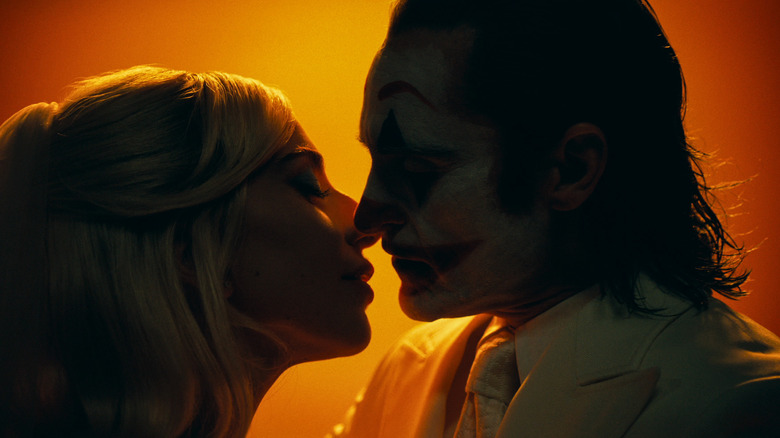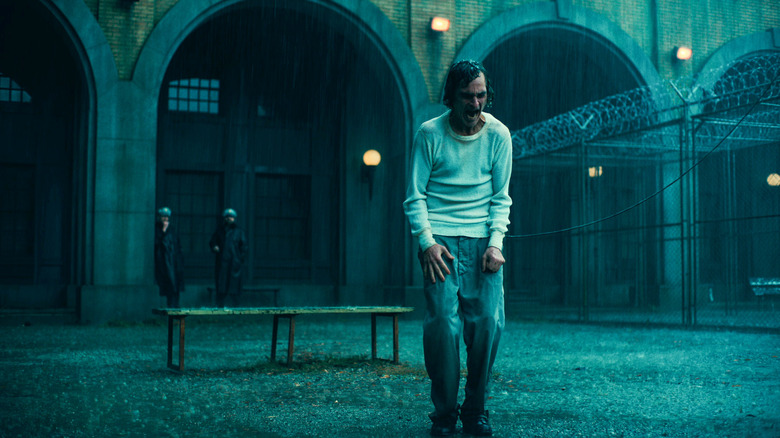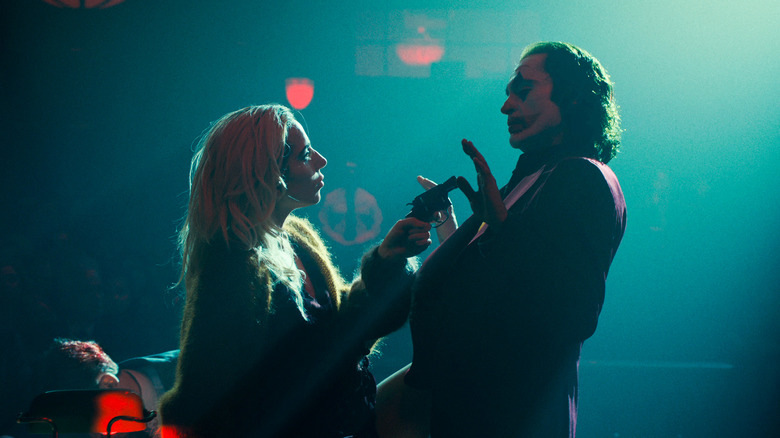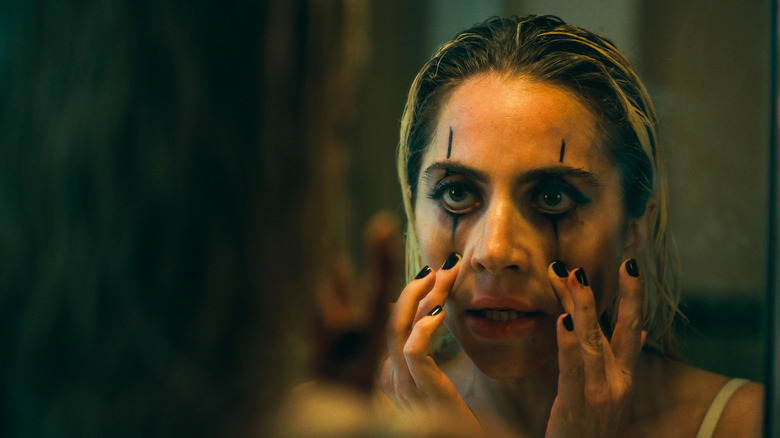Joker: Folie à Deux Review: The Year's Boldest Comic Book Movie Is A Compelling Musical Deconstruction
Why is the Joker so beloved? It's a question worth pondering, primarily because the character's worship seems baffling on paper. Sure, it makes sense why he's popular; he's one of the all-time great villains, and a hero like Batman is only as good as their villain. Yet the Joker's status as an icon has grown beyond his function as a foil to the Dark Knight. The hysteria surrounding the late Heath Ledger's portrayal of the character in "The Dark Knight" was totally explicable given Ledger's James Dean-esque tragic mystique, yet Joker mania has only increased since that film. The character is on the same level as other fictional villains like Walter White, Michael Corleone, and Freddy Krueger. In terms of morality, none of these characters should be revered, yet they are.
There is an easy answer to this question, of course: such despicable villains have always drawn the attention and fascination of us so-called good people. From Richard III to Hannibal Lecter, these characters provide a vessel with which to explore and even indulge in our dark sides, the things we mustn't think about, let alone do or say. Yet as a result of this, these characters are elevated to icon status, becoming more of a symbol than something more definitive. Joker may be the perfect example of an image eclipsing the character; his origin has purposely never been rigidly defined, and even his actual origins are vague, with creators Bill Finger, Bob Kane, and Jerry Robinson all having different accounts of how he first appeared in the Batman comic books. There is no "definitive" Joker, and at this point, there may never be.
It's these themes and questions involving the character that director/co-writer Todd Phillips' new film "Joker: Folie à Deux," attempts to tackle head-on. Following 2019's "Joker," which saw Joaquin Phoenix delve into the grittiest and most grounded interpretation of the character thus far, "Folie à Deux" has Phoenix, Phillips, co-writer Scott Silver and co-star Lady Gaga seeing how much further they can deconstruct and stretch the character and his world into psychological realism without losing his genre roots. Their solution — to turn the film into a musical — is one that makes this sequel the most compelling comic book movie of the year.
Joker: Folie à Deux is an extension of the first film with a musical twist
After a table-setting cartoon (by Sylvain "The Triplets of Belleville" Chomet) entitled "Me and My Shadow" which also doubles as a mini-recap of the first "Joker," "Folie à Deux" begins with Arthur Fleck (Phoenix) incarcerated in Gotham City's Arkham State Hospital. Although one could interpret "Joker" as being wholly made up of Fleck's delusions, "Folie à Deux" assumes that everything in that film occurred as shown, and that following its conclusion, the myth and influence of the Joker has only grown. Meanwhile, Arthur himself has seemingly lost his inner clown; he no longer smiles, let alone laughs, his daily medication keeping him docile while the facility's gang of guards (led by Brendan Gleeson, sporting a helluva shark's smile) taunt him by promising to trade a joke for a cigarette. It's only when Arthur spots Lee (Lady Gaga), a patient at the minimum security ward, that he begins to come back to life. The two bond when enrolled in the same music therapy class, the instructor of which encourages the patients to just start singing whenever their feelings move them to do so.
With that, Phillips gives the movie license to become an integrated musical of sorts. To be accurate, most of the musical numbers performed in "Folie à Deux" are fantasy sequences, taking the waking delusions Arthur experienced in the first film and expanding them into full-blown daydream alternate realities. This isn't quite Rob Marshall's "Chicago," however, thanks to the inclusion of Lee. She's a Joker stan, to use the parlance of today, and as per the "madness shared by two" subtitle of the movie, she and Arthur seem to share the same delusions from time to time, leading to some musical performances that are happening in the "real" world. Whether other characters can hear their performances or not, all of the singing and dancing in the movie is performed by Arthur and Lee, an indication of the special bond the two share. (Also special: the way composer Hildur Guðnadóttir weaves her original score in between and in conjunction with the handful of songbook standards performed in the film.)
So, while Joker and Harleen "Lee" Quinzel are starring in their very own musical, the rest of "Folie à Deux" concerns Arthur being put on trial for the murders he committed during the first movie. Sure enough, as per a number of high-profile criminal trials over the decades, the proceedings become a media frenzy as cocky young prosecutor Harvey Dent (Harry Lawtey) attempts to portray Arthur as a competent killer while defense attorney Maryanne Stewart (Catherine Keener) tries to convince the world that Arthur and the Joker are two distinct personalities. In this way, "Folie à Deux" feels like an extension of the first "Joker," even a bit of an extended epilogue, rather than solely its own movie. While the lack of shenanigans happening in Gotham (or anything outside the asylum and courthouse, really) could frustrate some, the film does honor its "part two" status, even returning to some characters and events from the first movie that helps flesh them out better.
A great character piece that unfortunately stifles its satire
Even more than its status as a movie musical, the relatively insular nature of "Folie à Deux" is likely to be the film's hardest pill to swallow. After all, one of the pleasures of the first "Joker" was the way it presented a Gotham City heavily reminiscent of New York City circa 1981; despite all the cartoon and musical number flourishes seen in the film, "Folie à Deux" is a far more muted experience visually. That insularity does properly support Phillips and company's goal of keeping "Joker" a character study. To their credit (and like its predecessor), this is not a comic book movie that has a different flavor only to end up at the same third act "get-to-the-MacGuffin" explosions and punches climax. More than every other comic book adaptation, "Folie à Deux" feels blissfully untethered from the demands of the genre and any attendant franchises or cinematic universes. There is a bit of a drawback to that, however, and for this film it's the complete and total lack of the Bruce Wayne/Batman character. In the first "Joker," this aspect was handled rather brilliantly, presenting Wayne and his family as corrupt antagonists to poor, disparaged Arthur, flipping the script on the hero/villain dynamic as makes psychological sense when the perspectives are reversed.
Phillips and Phoenix are trying a similar trick here in the sequel, albeit one that's not as resonant: instead of Joker versus Batman, and Arthur versus Gotham (aka "society"), this film presents Arthur versus Joker, or more specifically, Arthur versus the Joker's fandom. A worthy idea, to be sure, yet one that the movie doesn't quite commit to hard enough. This may be a byproduct of the way that Joker means different things to different people in the real world; the film is trying to explore and reconcile all these facets, keeping Arthur sympathetic while acknowledging and not apologizing for his crimes. Like the first "Joker," Arthur is very much at the center of the story, which keeps it of a piece with its predecessor. Yet sticking so closely to the character's inner struggle doesn't fully allow for the movie's satire of the media and the fascination pop culture has with true crime and scandal to soar. Perhaps Phillips and company were worried they might get too close to something like "Natural Born Killers" or even "The People Vs. Larry Flynt," and ironically, it's the brief flashes of films like that in this material which leaves it feeling somewhat incomplete.
Lady Gaga's Lee finally justifies the Joker and Harley relationship
Although the movie's satire is a little too toothless, its exploration of what happens when a criminal (or any public figure) gains an image that becomes so enormous the person at its center no longer matters is handled very well. Phoenix plays his part in this as compellingly as he portrayed Arthur in the first movie; his work here feels like he shot it immediately after wrapping "Joker," so in-step is he with the character. The revelation of the movie is Gaga as Lee: on a technical level, it's so impressive to see how the actress and musician modulates her talent and abilities. To better suit the film's aesthetic (and match Phoenix's method of performing his songs in character), Gaga lets Lee have a breathy, pitchy style to her singing, only opening up the throttle during some of the fantasy musical numbers. It's a performance that recalls Ellen Greene's Audrey in "Little Shop of Horrors," demonstrating Gaga's huge range.
What's even better is how she's able to tap into the psychological realism of Harleen in a similar fashion to Phoenix's take on Arthur. I admit that I've never fully bought into the character of Harley Quinn when it comes to her relationship with Joker, as the toxicity and audacity of their story tends to make me roll my eyes (the nadir of this is their portrayal in 2016's "Suicide Squad"). Here, however, Harley comes to life in a way she never has before, her madness and obsession parallel yet distinct from Joker's. It makes the Arthur and Lee relationship consistently engaging and fascinating throughout the movie, taking it beyond the trite "she was his queen" emo edgelord nonsense and into something much deeper and more complex.
"Folie à Deux" isn't the last word on Harley or the Joker, because at this point, nothing can be. Yet the film may end up being the most fascinating take on the characters, if only because they've been given the space and respect to be explored, regardless of their usual place in their genre and lore. That a movie can appeal equally to people both familiar with these characters as well as those totally unfamiliar with them is the ultimate achievement of any adaptation, really, one that more franchise and IP films should be striving for these days. "Joker: Folie à Deux" may not be able to encapsulate the totality of the character, and may attempt to bite off more than it can chew. Yet it feels remarkably honest and true to itself, demonstrating again that taking such a popular character seriously is nothing to laugh at.
/Film Rating: 8 out of 10
"Joker: Folie à Deux" opens in theaters on October 4, 2024.



